An Excerpt from Srila Prabhupada’s Work-in-Progress
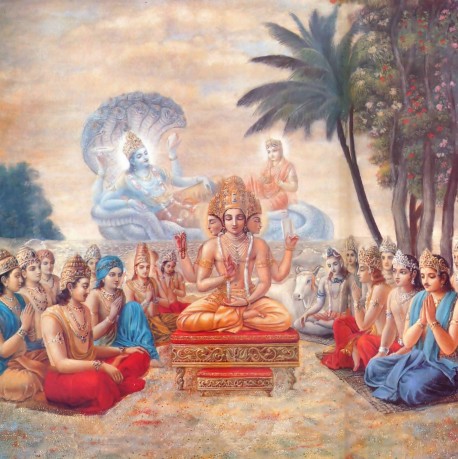
Fifty centuries ago Lord Krishna came, to protect His devotees and rid the world of demonic politicians. Now Krishna comes again in another form—the Tenth Canto of the Srimad-Bhagavatam (“The Beautiful Story of the Personality of Godhead”), translation and commentary by His Divine Grace A.C. Bhaktivedanta Swami Prabhupada.
For many years His Divine Grace A.C. Bhaktivedanta Swami Prabhupada has been preparing a multivolume English translation of the Srimad–Bhagavatam (“The Beautiful Story of the Personality of Godhead”)—a monumental Sanskrit work known as “the ripened fruit of the tree of Vedic literature.” Recently, Srila Prabhupada reached a milestone as he began translating the Bhagavatam’s Tenth Canto, the essence of this five-thousand-year-old classic.
The imminent publication of the Tenth Canto is momentous not only for the Krishna consciousness movement but for the entire world Scholars, theologians, and librarians throughout the United States, Canada, Europe, and India have already placed more than two thousand orders for all sixty volumes of Srila Prabhupada’s Bhagavatam—even before many of the books have been translated and printed! Many scholars, aware of the exalted place the Bhagavatam holds in Vedic literature, have personally expressed their appreciation for Srila Prabhupada’s unequaled English rendering. For these scholars (and, even more, for Srila Prabhupada’s thousands of disciples), the appearance of the Tenth Canto marks a spiritual and literary event of the highest magnitude.
The reason the Tenth Canto has such special significance is that it describes Lord Krishna in His original and most attractive feature—as a cowherd boy in the village of Vrndavana. There He plays on His flute, steals butter from His mother’s churning pot, and charms His dear friends with His irresistible personality. With eyes like lotus petals and a complexion like a dark bluish cloud, He possesses an ever-fresh beauty that defies description. Other Vedic literatures give only a small hint of Lord Krishna’s own intimate, spiritual abode, but in the Srimad-Bhagavatam—and especially in the Tenth Canto—Krishna personally appears and reveals His supremely attractive and most confidential pastimes.
There is one great advantage that Srila Prabhupada’s long-awaited translation of the Tenth Canto holds over previous translations. Because Srila Prabhupada is a pure devotee of the Lord, one who submissively hears Krishna’s pastimes from him experiences a change of heart, and the hearer’s self-defeating disposition to enjoy the material world slackens. Thus his long-forgotten natural love for Krishna awakens and he develops an attraction for hearing more and more about the Lord.
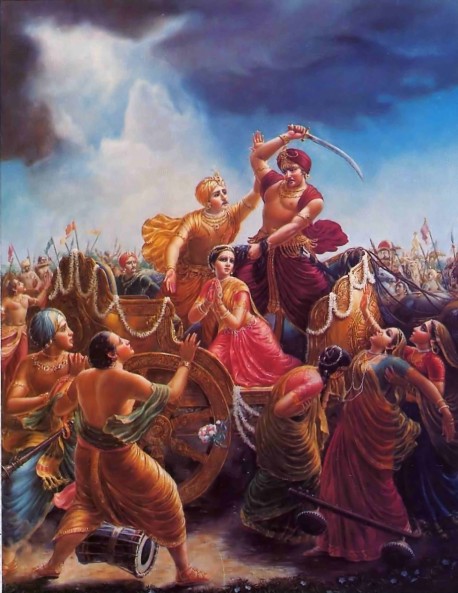
Unfortunately, those who receive the message of the Bhagavatam from someone other than an expert spiritual master—a pure devotee of Krishna in the disciplic succession coming down from Krishna Himself—generally misinterpret the Lord’s pastimes described in the Tenth Canto. Instead of becoming purified by hearing of the Lord’s loving affairs with His devotees, such careless interpreters, casual readers, and mental speculators offend the Lord, and their spiritual advancement is checked.
The conclusion, therefore, is that one must learn the book Bhagavata from the person bhagavata, one whose very life embodies the teachings of the Bhagavatam. If one hears about the Lord in this authorized way, his feeling for loving devotional service to Lord Krishna, the Supreme Personality of Godhead, awakens within his heart and extinguishes the. fire of material suffering. Ultimately, the sincere student of the Srimad-Bhagavatam realizes his original, transcendental relationship with the Lord and, upon giving up his body at death enters into Lord Krishna’s eternal pastimes in the spiritual world.
What follows is an excerpt from the completed third chapter of the Tenth Canto, prepared by Srila Prabhupada at ISKCON’s Krishna-Balarama temple in Vrndavana, India.
The Advent of Lord Krishna
At the auspicious time for the appearance of the Lord, the entire universe was surcharged with all the qualities of goodness, beauty, and peace. The constellation Rohini appeared, as did stars like Asvini. The sun, the moon, and the other stars and planets were very peaceful. All directions appeared extremely pleasing, and the beautiful stars twinkled in the cloudless sky.
Decorated with towns, villages, mines, and pasturing grounds, the earth seemed all-auspicious. The rivers flowed with clear water, and the lakes and vast reservoirs, full of lilies and lotuses, were extraordinarily beautiful. In the trees and green plants, which were full of flowers and leaves, pleasing to the eyes, birds like cuckoos and swarms of been began chanting with sweet voices for the sake of the demigods. A pure breeze began to blow, pleasing the sense of the hearer’s touch and bearing the aroma of flowers, and when the brahmanas who were engaged in ritualistic ceremonies ignited their fires according to Vedic principles, the fires burned steadily, undisturbed by, the breeze.
Thus when the birthless Lord Visnu, the Supreme Personality of Godhead, was about to appear, the saints and brahmanas, who had always been disturbed by demons like Kamsa and his men, felt peace within the core of their hearts, and kettledrums simultaneously vibrated from the upper planetary system. The Kinnaras and Gandharvas, inhabitants of the heavenly planets, began to sing auspicious songs; the Siddhas and Caranas offered auspicious prayers; and the Vidyadharis, along with the Apsaras, began to dance in jubilation.
The demigods and great saintly persons showered flowers in a joyous mood, and clouds gathered in the sky and very mildly thundered, making sounds like those of the ocean’s waves. Then the Supreme Personality of Godhead, Visnu, who is situated in the core of everyone’s heart, appeared from the heart of Devaki in the dense darkness of night, like the full moon rising on the eastern horizon, because Devaki was of the same category as Sri Krishna
[As stated in the Brahma-samhita (5.37):
ananda-cinmaya-rasa-pratibhavitabhis
tabhir ya eva nija-rupataya kalabhih
goloka eva nivasaty akhilatma-bhuto
govindam adi-purusam tam aham bhajami
This verse indicates that Krishna and His entourage are of the same spiritual potency (ananda-cinmaya-rasa). Krishna’s father, His mother. His friends the cowherd boys, and the cows are all expansions of Krishna, as will be explained in the brahma-vimohana-lila. When Brahma took away Krishna’s associates to test the supremacy of Lord Krishna, the Lord expanded Himself again in the forms of the many cowherd boys and calves, all of whom, as Brahma saw, were visnu-murtis [forms of Krishna]. Devaki is also an expansion of Krishna, and thus the Bhagavatam says, devakyam deva-rupinyam visnuh sarva–guha-sayah.
The objection may be raised that since Lord Krishna appeared on the eighth day of the waning moon, there could be no rising of the full moon. In answer to this it may be said that Lord Krishna appeared in the dynasty which is in the hierarchy of the moon; therefore, although the moon was incomplete on that night, because of the Lord’s appearance in the dynasty wherein the moon is himself the original person, the moon was in an overjoyous condition, so by the grace of Krishna he could appear just as a full moon. To welcome the Supreme Personality of Godhead, the waning moon became a full moon in jubilation.
Those who are not in full knowledge that the appearance and disappearance of the Lord are transcendental (janma karma ca me divyam) are sometimes surprised that the Supreme Personality of Godhead can take birth like an ordinary child. Actually, however, the Lord’s birth is never ordinary. The Supreme Personality of Godhead is already situated within the core of everyone’s heart as antaryami, the Supersoul. Thus because He was present in full potency in Devaki’s heart, He was also able to appear outside her body.
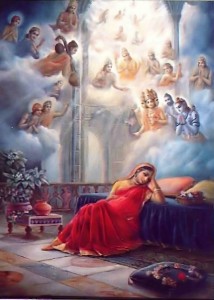
In the Srimad-Bhagavatam (1.9.42), Bhisma, a great authority to be followed by devotees, says that the Supreme Personality of Godhead is situated in the core of everyone’s heart, just as the sun may be on everyone’s head. Yet although the sun may be on the heads of millions and millions of people, this does not mean that the sun is variously situated. Similarly, because the Supreme Personality of Godhead has inconceivable potencies, He can be within everyone’s heart and yet not be variously situated. Ekatvam anupasyatah (Isopanisad 7). The Lord is one, but He can appear in everyone’s heart by His inconceivable potency. Thus although the Lord was within the heart of Devaki, He appeared as her child. According to the Visnu Purana, therefore, the Lord appeared like the sun (anugrahasya). The Brahma-samhita (5.35) confirms. that the Lord is situated even within the atom (andantara-stha-paramanu-cayantara stham). He is situated in Mathura, in Vaikuntha; and in the core of the heart. Therefore one should clearly understand that He did not live like an ordinary child in the heart or the womb of Devaki. Nor did He appear like an ordinary human child, although He seemed to do so in order to bewilder asuras (demons) like Kamsa. The asuras wrongly think that Krishna took birth like an ordinary child and passed away from this world like an ordinary man. Such asuric conceptions are rejected by persons in knowledge of the Supreme Personality of Godhead. Ajo ‘pi sann avyayatma bhutanam isvaro ‘pi san (Bg. 4.6). As stated in Bhagavad-gita, the Lord is aja, unborn, and He is the supreme controller of everything. Nonetheless, He appeared as the child of Devaki. This verse describes the inconceivable potency of the Lord, who appeared like the full moon. Understanding the special significance of the appearance of the Supreme Godhead, one should never regard Him as having taken birth like an ordinary child.]
Vasudeva then saw the newborn child, who had very wonderful lotuslike eyes and who bore in His four hands the four weapons sankha, cakra, gada and padma [conchshell, disc, club, and lotus]. On His chest was the mark of Srivatsa and on His neck the brilliant Kaustubha gem. Dressed in yellow, His body blackish like a dense cloud, His scattered hair fully grown, and His helmet and earrings sparkling uncommonly with the valuable gem Vaidurya, the child, decorated with a brilliant belt, armlets, bangles, and other ornaments, appeared very wonderful.
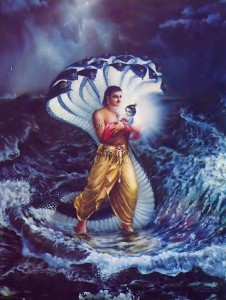
When Vasudeva saw his extraordinary son, his eyes were struck with wonder. In transcendental jubilation, he mentally collected ten thousand cows and distributed them among the brahmanas as a transcendental festival.
Vasudeva could understand that this child was the Supreme Personality of Godhead, Narayana. Having concluded this without a doubt, he became fearless. Bowing down with folded hands and concentrated attention, he began to offer prayers to the child, who was illuminating His birthplace by His natural influence.
Vasudeva prayed, “O my Lord, proprietor of all creation, You have now appeared in my house, desiring to give protection to this world. I am sure that You will kill all the armies that are moving all over the world under the leadership of politicians who are dressed as ksatriya rulers but who are factually all demons. They must be killed by You for the protection of the innocent public.”
[Krishna appears in this world for two purposes, paritranaya sadhunam vinasaya ca duskrtam: to protect the innocent, religious devotees of the Lord and to annihilate all the uneducated, uncultured asuras who unnecessarily bark like dogs and fight among themselves for political power. It is said, kali-kale nama-rupe Krishna-avatara. The Hare Krishna movement is also an incarnation of Krishna in the form of the holy name (nama-rupe). Every one of us who is actually afraid of the asuric rulers and politicians must welcome this incarnation of Krishna: Hare Krishna, Hare Krishna, Krishna Krishna, Hare Hare/ Hare Rama, Hare Rama, Rama Rama, Hare Hare. Then we will surely be protected from the harassment of asuric rulers. At the present moment these rulers are so powerful that by hook or by crook they capture the highest posts in government and harass countless numbers of people on the plea of national security or some emergency. Then again, one asura defeats another asura, but the public continues to suffer. Therefore the entire world is in a precarious condition, and the only hope is this Hare Krishna movement.
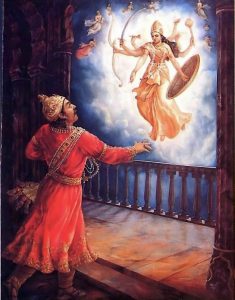
Lord Nrsimhadeva appeared when Prahlada was excessively harassed by his asuric father. Because of such asuric fathers—that is, the ruling politicians—it is very difficult to press forward the Hare Krishna movement, but because Krishna has now appeared in His holy name through this movement, we can hope that these asuric fathers will be annihilated and the kingdom of God will be established all over the world. The entire world is now full of many asuras in the guise of politicians, gurus, sadhus, yogis, and incarnations, who are misleading the general public away from Krishna consciousness, which can offer true benefit to human society.]
Vasudeva continued, “O my Lord, Lord of the demigods, after hearing the prophecy that You would take birth in our home and kill him, this uncivilized Kamsa killed so many of Your elder brothers. As soon as he hears from his lieutenants that You have appeared, he will immediately come with weapons to kill You.”
[Kamsa has here been described as asabhya, meaning “uncivilized” or “most heinous,” because he killed the many children of his sister. When he heard the prophecy that he would be killed by her eighth son, this uncivilized man, Kamsa, was immediately ready to kill his innocent sister on the occasion of her marriage. An uncivilized man can do anything for the satisfaction of his senses. He can kill children, he can kill cows, he can kill brahmanas, he can kill old men; he has no mercy for anyone. According to the Vedic civilization, cows, women, children, old men, and brahmanas should be excused even if they are at fault But asuras, uncivilized men, do not care about that. At the present moment, the killing of cows and the killing of children are going on unrestrictedly, and therefore this civilization is not at all human, and those who are conducting this condemned civilization are uncivilized asuras.
Such uncivilized men are not in favor of the Krishna consciousness movement. As public officers, they declare without hesitation that the chanting of the Hare Krishna movement is a nuisance, although the Bhagavad-gita clearly says, satatam kirtayanto mam yatantas ca drdha-vratah. According to this verse, it is the duty of the mahatmas to chant the Hare Krishna mantra and try to spread it all over the world to the best of their ability. Unfortunately, society is in such an uncivilized state that there are so-called mahatmas who are prepared to kill cows and children and stop the Hare Krishna movement. Such uncivilized activities, like those of history, were actually demonstrated in connection with the Hare Krishna movement’s Bombay center, Hare Krishna Land. As Kamsa was not expected to kill the beautiful child of Devaki and Vasudeva, the uncivilized society, although unhappy about the advancement of the Krishna consciousness movement, cannot be expected to stop it. Yet we must face many difficulties in many different ways. Although Krishna cannot be killed, Vasudeva, as the father of Krishna, was trembling because in affection he thought that Kamsa would immediately come and kill his son. Similarly, although the Krishna consciousness movement and Krishna are not different and no asuras can check it, we are afraid that at any moment the asuras can stop it in any part of the world.]
Thereafter, exactly when Vasudeva, being inspired by the Supreme Personality of Godhead, was about to take the newborn child from the delivery room, Yogamaya, the Lord’s spiritual energy, took birth as the daughter of Yasoda, the wife of Maharaja Nanda.
By the influence of Yogamaya, all the doorkeepers fell fast asleep, their senses unable to work, and the other inhabitants of the house also fell deeply asleep. When the sun rises, the darkness automatically disappears; similarly, when Vasudeva approached the closed doors, which were strongly pinned with iron and locked with iron chains, they opened automatically. Since the clouds in the sky were mildly thundering and showering, Ananta-naga, an expansion of the Supreme Personality of Godhead, followed Vasudeva, beginning from the door, with hoods expanded to protect Vasudeva and the transcendental child.
Because of constant rain sent by the demigod Indra, the River Yamuna was filled with deep water, foaming about with fiercely whirling waves. But as the great Indian Ocean had formerly given way to Lord Ramacandra by allowing Him to construct a bridge, so the River Yamuna gave way to Vasudeva and allowed him to cross.
When Vasudeva reached the house of Nanda Maharaja, he saw that all the cowherd men were fast asleep. Thus he placed his son on Yasoda’s bed, picked up her daughter (an expansion of Yogamaya) and then returned to the prisonhouse of Kamsa. Vasudeva then placed the female child on the bed of Devaki, bound his legs with the iron shackles, and thus remained there as before. Exhausted by the labor of childbirth, Yasoda was overwhelmed with sleep and unable to understand what kind of child had been born.
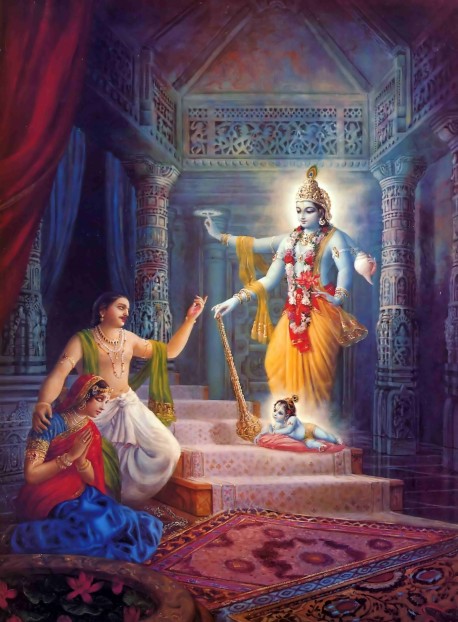

Leave a Reply